A moment for queer farmworkers to shine
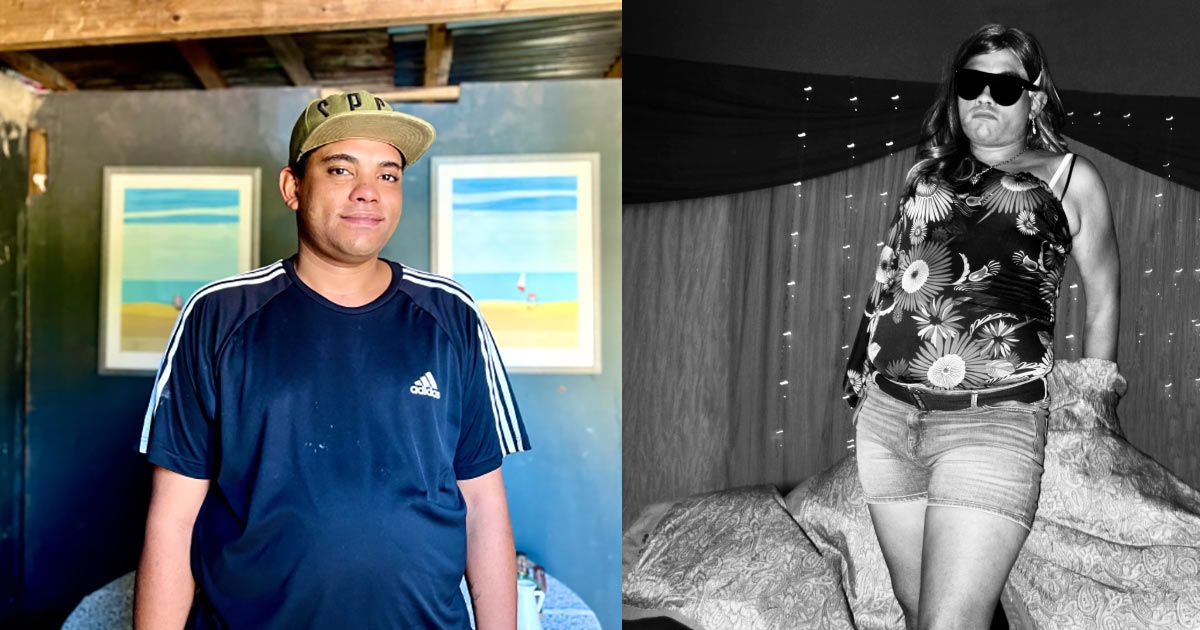
Rapheal February, one of the participants in the town’s first beauty pageant for farmworkers. (1st Photo: Carl Collison | 2nd Photo: Kallie Smit)
For queer folk in the small rural Western Cape town of Saron, participating in a queer-inclusive beauty pageant – Mrs and Miss Saron Agri – opened the door to a greater sense of purpose and self-worth.
When Rapheal February left the Eastern Cape in 2019 to settle in the rural Western Cape Town of Saron, the only employment option for the 25-year-old was as a farmworker.
Located approximately 130 km from Cape Town, Saron is home to approximately 7 000 people, many of whom are employed on the surrounding farms.
“Die area is net gewoond aan plaaswerk. Daar is nie ander werk nie. [This area only knows farm work. There are no other jobs.] When I got here, they said, ‘Here’s work.’ So,” he shrugs, “I climbed on a lorry.”
The adaptation was not easy, he says. “Dit was my eerste keer. Ek het niks geweet nie. [It was my first time. I didn’t know anything.] I mean, I came from a place where there are malls and stuff, but here I am: In Saron,” February says, laughing.
In addition to having to adapt to this new environment, there was also the heavily gendered nature of his workplace.
“In die wingerd, if you’re gay, jy word geklassifiseer as ’n vrou… Jy word nie geklasifiseer as ’n man nie. Dit is nie om te sê dat dit so is met alle gays nie. Onthou, jy kry femme en jy kry butch. As jy femme is, jy behoort onder die vrouens. As jy voel jy wil by die mans werk, dit hang van jou af. Maar meeste van ons werk onder die vrouens. [In the vineyard, if you’re gay, you are classified as a woman. You are not classified as a man. That’s not to say it is like that for all gay men, though. Remember, you get femme gay men and you get butch gay men. If you are femme, you are placed with the women. If you want to work with the men, that’s up to you. But most of us work with the women.”]
While this division was something of an adjustment for February, it is, he says, welcomed by other queer farmworkers who occasionally come to work dressed in “little skirts and tops, bras and headwraps”.
“Sommige tye kom hulle met hulle pruike en rokke en so [“Sometimes they come with their wigs and dresses and so on],” he adds.
February’s assertion that “when I am working on the farm, I wear men’s clothing because I am not a drag queen” changed somewhat earlier in 2023 when he, along with some of Saron’s other queer farmworkers, entered and participated in the Mrs and Miss Saron Agri beauty pageant.
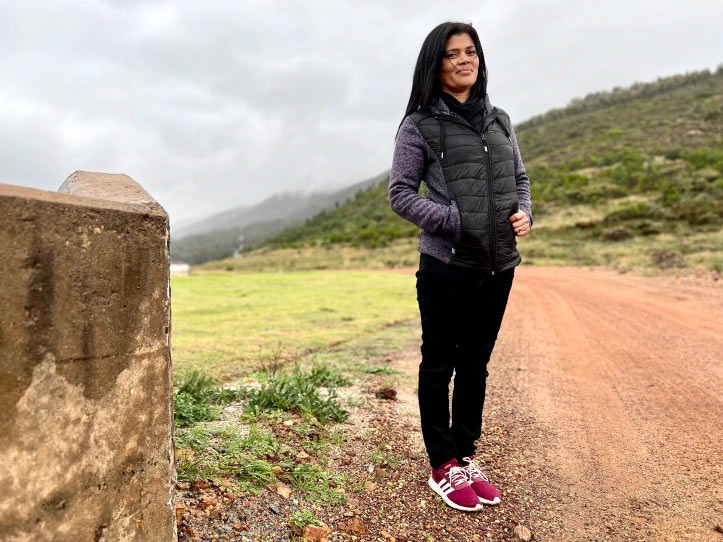
Despite some pushback, Maria Manuel stuck to her guns and included queer people in the pageant (Photo: Carl Collison)
A first for the town, the pageant is the brainchild of 48-year-old Maria Manuel. Like February, Manuel also relocated to Saron from a big city – Cape Town, in her case – and took up work as a farmworker. For the past six months, she has been working as a general worker on the farm, DasBosch, which she beamingly refers to as “die mooiste plaas [the most beautiful farm]”.
Beautiful as the farm may be, the work, she concedes, is “flippen swaar [very hard]”. It is, in large part, due to the punishing nature of farm work that the idea of the pageant was born.
“Die eerste keer wat ek op die plaas werk, toe … sien ek dis groot vroumense wat daar werk. Amper 60 jaar oud wat daar werk. En toe vra ek, ‘Nou hoe lank werk antie nou hier?’ En hulle werk al van kleintyds af. Van 12, 13 tot nou. [When I first started as a farmworker, I noticed that there were older women working there. Women close to 60 years old. I would ask, ‘How long is aunty working here?’ And they’d been working there since they were children. From 12 or 13, until today.]”
Taking her inspiration from the annual Spring Queen contest (the former annual beauty pageant for factory workers across Cape Town), Manuel began putting together Mrs and Miss Saron Agri as a church fundraiser.
Says Manuel: “Ek het net gedink: Kom ons gee vir die plaas dames daai moment to shine. Want baie van hulle het nooit ’n prom of ’n matric ball gehad nie… As dit by hulle kinders se matric kom – of die kinders se doop of confirmation – dan spaar hulle hulle bietjies geld en sit alles in hulle kinders in. Maar hulle sit altyd vir hulle heel laaste. [I just thought: Let’s give these women their moment to shine. Because many of them never had a prom or matric ball. When it comes to their children’s matric ball – or their children’s baptism or confirmation – they would save what little money they have and put everything into these events for their children. But they always put themselves last.]”
Manuel’s decision to open the pageant to “wie-ever op die plaas werk – al is jy wit, swart, gay of whatever [whoever works on a farm – whether you are white, black, gay or whatever]” did not sit well with everyone.
Established as a mission station in 1848, Saron is still a deeply religious town. And one where attitudes towards queer people are often conservative.
Says February: “Saron is ’n klein plekkie. Baie liefdevol, maar daar is nog steeds baie hate – veral teenoor ons as LGBTIQ+ mense. [Saron is a very small town. Very loving, but there is still a lot of hate – especially against us as LGBTIQ+ people.]”
Although Manuel insists that members of the Old Apostolic Church, to which she belongs, “didn’t have an issue at all” with including LGBTIQ+ people in the event, some quarters viewed things differently.
“Hulle het ook vir my gevra hoekom gaan hulle [LGBTIQ+] mense model. Ons moet vir hulle apart hê. Maar vir my was dit: almal werk mos op plase. So ek kan nie dat hulle apart loop nie. [They asked me why these LGBTIQ+ people would also be participating. That they should be in a separate event. But I took it as: Everyone is working on farms. So I can’t let them participate separately],” she says.
Her unwillingness to yield paid off. Soon after announcing the event would take place, and putting out a call for participants, Manuel says there was great excitement.
On 15 April 2023, at the Saron Community Hall, lorries and buses started arriving three hours before the event, transporting people eager to ensure they had seats.
Backstage in the community hall’s dressing room, the 34 participants (representing seven farms) readied themselves.
Says February: “Almal het mekaar gehelp. Daar kon ’n hele onenigheid daar agter gewees het tussen al die contestants… Maar almal wou gehê het dat jy moet mooi lyk as jy uit stap. En dit was vir my die cherry op die koek. [Everybody helped each other. There could have been a lot of disunity backstage among the contestants, but everyone wanted everyone else to look beautiful as they stepped out. And for me that was the cherry on the cake.]”
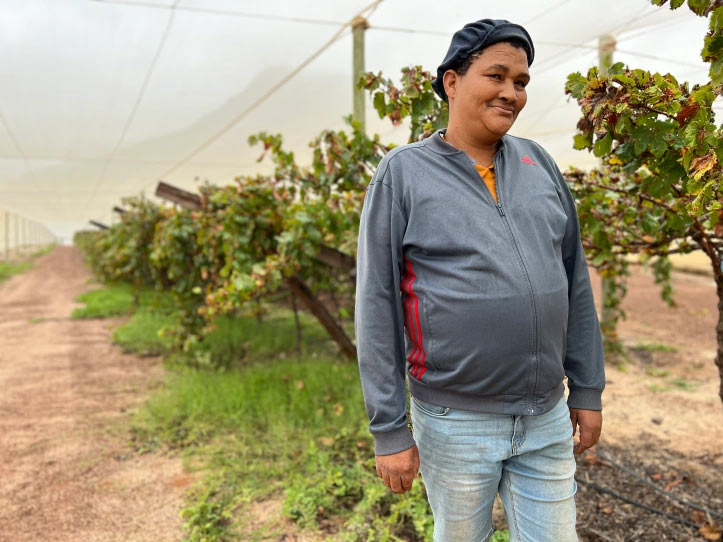
Willem van Rooy, 44, overcame his nervousness about being in the pageant once he heard the audience cheering him on (Photo: Carl Collison)
Willem van Rooy, a gay man who represented DasBosch, where he has been working for the past 12 years, laughs as he recalls his nervousness.
“Ek het dit nooit voorheen gedoen nie [I’d never done it before],” he says. “Ek het net gedink: ‘Ek kan nie model nie. Ek gaan ’it ’ie maak ’ie!’ Ek sê daar by die werk: ‘Hoe gaan ek dan lyk? Ek is dan so hoog! Watter klere gaan ek aantrek?’ Maar toe iemand vir my opmaak… toe sê ons mense – my mense – vir my: ‘Oh, jinne, Willie, maar jy lyk pragtig.’ Net vir daai moment, het dit vir my gevoel ek gaan dit nou my aand maak… En toe die mense so skree, toe gee dit weer vir my moed en hoop. Toe voel dit vir my: ‘Nee, dis jou tyd. Gaan maar.’ [I kept thinking, ‘I can’t model. I’m not going to make it.’ At work, I told them, ‘How am I going to look? I’m so tall! What will I wear?’ But when they started doing me up, people – my people – were telling me: ‘Wow, Willie, you look pretty.’ In that moment, I decided to make it my evening… And when people were cheering me on, it gave me courage and hope. To me, it felt like, ‘It’s your time. Do it.’]”
Van Rooy smiles shyly as he adds: “Dit was my eerste keer, maar ek was ’n finalis. Ek was so trots. [It was my first time, but I was one of the finalists. I was really proud of myself.]”
For Manuel, this sense of pride is especially important, given the fact that, as she says, “niemand sien vir ons as plaaswerkers raak nie [nobody sees us farmworkers]”.
“Op die einde van die dag, daai appel wat jy kry in Woolworths: ons het dit gepluk… Dit was warm. Dit was 40 grade. Waar jy gesit het by die beach, het ons hard gewerk. In die winter, waar jy onder die duvet gelê het, het ons in die reën gewerk. Rerig! Ons werk flippen hard, maar niemand sien vir plaas mense nie. So die event was, like, ek weet nie… Ek kan nie describe hoe dit was nie. Dit was amazing. [At the end of the day, that apple you buy at Woolworths: we picked it… It was hot. Forty degrees. And while you were sitting at the beach, we were working hard. In winter, while you were under your duvet, we were working in the rain. Really! We work very hard, but nobody sees farmworkers. So this event was, like, I don’t know… I can’t describe it. It was amazing.]”
“Amazing” is the same word February uses to describe his first time in drag, truly expressing himself in his new hometown – and walking away with the Miss Personality title.
“Ek sal dit weer doen [I would do it again],” he says. “Ek was altyd bang, maar nie meer nie. Vir my was dit nie oor prys nie. Vir my was dit ek wys vir die mense ek is iemand in die lewe. Ek is ‘n mens. En ek is waardevol. [I was always scared, but no longer. For me, it wasn’t about winning a prize. For me, it was about showing people I am somebody. I am a person. And I am valuable.]”
View images of the 2023 Mrs and Miss Saron Agri pageant by Kallie Smit below.
This article by Carl Collison and the accompanying images were first published by Beyond the Margins.
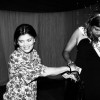
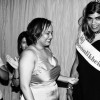
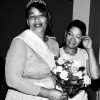
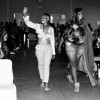
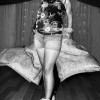
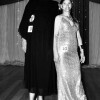
❤️🏳️🌈